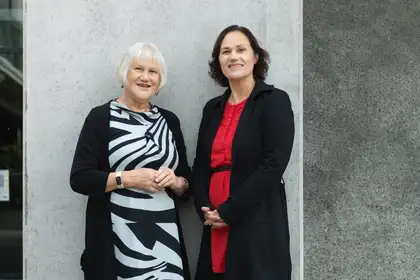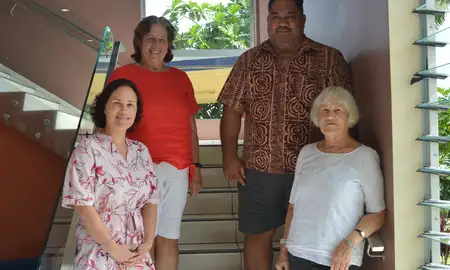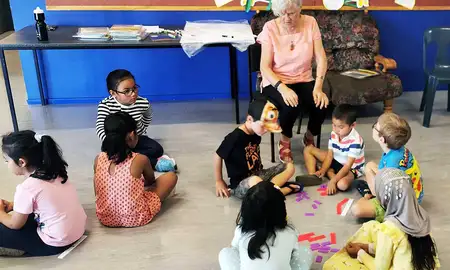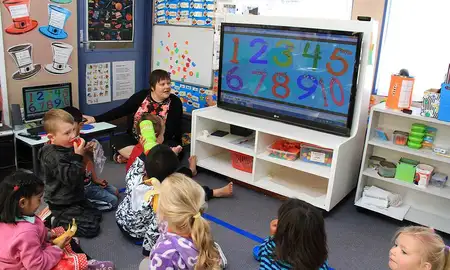
Professor Roberta Hunter (left) and Associate Professor Jodie Hunter. Photo credit: Jane Ussher.
"I'm no good at maths."
It’s a common refrain among students and adults alike. There’s even a clinical term for the rising tension many people feel when confronted with a maths problem: 'Mathematics Anxiety'. This condition can negatively affect people throughout their schooling and later work life.
Associate Professor Jodie Hunter from Massey's Institute of Education says it comes down to the way maths is taught.
“There’s a societal view that some people are innately good at maths and others aren’t. Yet we don’t do that with other subjects like reading. A lot of children end up avoiding maths because they’ve had negative experiences.”
Enabling students to feel more comfortable and at home with their maths lessons is at the heart of work currently being undertaken at the Massey Centre for Research in Mathematics Education. It promotes the idea that all children can do maths, given the right environment in schools.
Professor Roberta Hunter says maths is taught in an inflexible way when teachers could get better results by drawing on the everyday strengths children bring with them into the classroom.
“Our research recognises the innate cultural aspects of mathematics. We aren’t necessarily talking ethnicity here, we could be talking about a local community where kids spend a lot of time at the skateboard park.”
Ideally in this kind of scenario, teachers would engage students by teasing out the mathematical aspects of skateboarding, orienting them to see their favourite activity through a mathematical lens.
Institute of Education Lecturer Generosa Leach says, “It’s those real-life experiences where children are actually using maths, but it's the teacher making the mathematics explicit."
The research also indicates that better results may be obtained by having children work together on maths problems rather than in isolation, where they feel more exposed. It’s been shown that this approach improves the wellbeing of students, with a marked drop in the incidence of bullying.
“Our school system was really set up to value individualism. So if you're coming from a collectivist cultural heritage, like Māori and Pacific students, you have to give up a lot of your identity to succeed at school," Associate Professor Jodie Hunter says.
She emphasises that the research is focused not so much on children who are struggling, but with school systems that are failing, particularly for children from marginalised communities.
The researchers have worked as consultants overseas, including with the education sector in Sweden, the United Kingdom and Singapore.
Associate Professor Hunter says they've been invited over to Texas to talk about the work they're doing with marginalised communities.
"There it’s migrant families, Latino students, indigenous students – typically the children who have different values or belief systems from the dominant group.”
With funding support from the U.S. Embassy, the researchers are currently developing sets of mathematical tasks and resources for teachers in New Zealand, Niue and the Cook Islands which draw on localised content. In Niue, for example, they have been working with teachers to find out how children might recognise maths in their daily lives.
“If you travel in or out of Niue, everyone has a chilly bin of food. You could look at volume by asking how many containers of nane, which is the local coconut porridge, would fit into a chilly bin," Associate Professor Hunter says.
There is no word for 'fractions' in many Pacific languages, but there is the concept of parcelling out shares of food, so the teachers would talk about fractions of a pig, for example, and which family got what part.
Another example might be discussions around the correct proportions of taro, pawpaw and coconut cream required to produce the perfect Niuean Takihi.
In Aotearoa New Zealand, the team has received funding from the Pacific Wellbeing Budget and annual funding from the Ministry of Education. They work as mentors in schools, alongside maths teachers, to co-construct lessons.
Associate Professor Hunter describes maths as a gatekeeper.
“If you don’t succeed in maths at school it means a whole lot of doors close for you for educational opportunities, work opportunities, and even in your everyday life. So it’s really problematic if you’re leaving school without a good degree of mathematical literacy. We hear a lot from schools about how engaging with this work has raised their teachers’ expectations of what children can achieve and what they are capable of.”
The Institute is now planning to bring together maths education researchers from across the country for a two-day meeting to work collectively to think about effective common practices for maths teaching. They hope this will support the common practice model the Ministry of Education is developing for implementation in 2024.
Related news
How two Massey academics are helping to teach maths in the Cook Islands
The way that school children in the Cook Islands are being taught maths is undergoing a shake up, thanks to a group of academics from New Zealand, the United States and Australia.

Summer sums lure West Auckland maths fans
Summer holidays plus maths classes would not normally add up. But that is exactly what more than 150 Auckland primary school pupils have signed up for: a holiday maths programme combining a Pasifika cultural approach with robotics technology.

Maths achievement for all – teachers do the numbers
Maths apps, maths anxiety, and developing better teaching tools for students from diverse socio-economic and ethnic backgrounds are among hot topics at a major conference of maths experts from around the globe gathering at Massey University this week.
